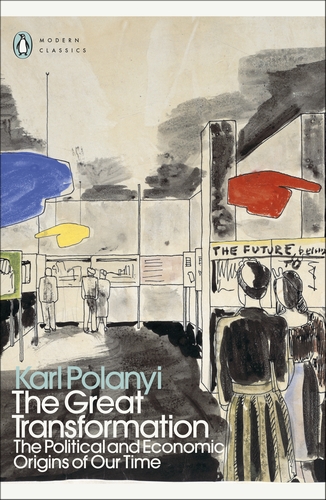Living through another great transformation…

Karl Polanyi’s Great Transformation is one of these famous books whose ideas have been so absorbed into social sciences that the books themselves are no longer read. This would be, in this case like in many others, a mistake because there is much more in the book than the kernel that we all know.
For those who may be new to the area, let me just summarize the main insights of Polanyi’s. Market economy, defined as an economy that entirely depends on prices of commodities including market-determined prices factors of production (what Polanyi called “fictitious commodities”) of labor, land and money is an impossibility. It is impossible in practice because such an economy would annihilate society. This, Polanyi writes, was only imperfectly understood when the first time in history such an attempt was made during the British Industrial Revolution. “The Industrial Revolution was merely the beginning of a revolution so extreme and radical as ever inflamed the minds of sectarians, but the new creed was utterly materialistic and believed that all human problems could be resolved given unlimited amount of material commodities. (p. 40). Self-regulating market society would result (and in Britain it did initially result) in pauperism, vagrancy, alcoholism, insalubrious living conditions, “satanic mills”, much longer hours of work, shorter lives, lack of education, all the elements well known from economic history and from the works of literature.
 Thus, the “society” (a rather capacious term that Polanyi overuses) had to defend itself against a fully marketed economy At first, it defended itself through income guarantees included in parish Poor Laws, but that did not prevent the catastrophe. Subsidized cost of labor, i.e. what would be called today the Universal Basic Income, made people lazy, unwilling to work, or accepting to work for a derisory wage knowing that the rest will be covered from the public coffers. That defense was unsustainable. The real defense against the market came with de facto exemption from market-price determination of labor (wages), land and money. Wages are regulated (at the time of Polanyi’s writing, the early 1940s in Britain) by the bargaining between trade unions and employers; land use is subjected to increasing public control and oversight; price of money is regulated by the central bank. Thus, Polanyi maintains, market economy must be “embedded” (a famous term) in society and incomes (prices of factors of production) must be exempt from full market determination.
Thus, the “society” (a rather capacious term that Polanyi overuses) had to defend itself against a fully marketed economy At first, it defended itself through income guarantees included in parish Poor Laws, but that did not prevent the catastrophe. Subsidized cost of labor, i.e. what would be called today the Universal Basic Income, made people lazy, unwilling to work, or accepting to work for a derisory wage knowing that the rest will be covered from the public coffers. That defense was unsustainable. The real defense against the market came with de facto exemption from market-price determination of labor (wages), land and money. Wages are regulated (at the time of Polanyi’s writing, the early 1940s in Britain) by the bargaining between trade unions and employers; land use is subjected to increasing public control and oversight; price of money is regulated by the central bank. Thus, Polanyi maintains, market economy must be “embedded” (a famous term) in society and incomes (prices of factors of production) must be exempt from full market determination.
Putting it more succinctly, only a social democratic state is compatible with market economy. All other market economies will lead to the destruction of society. For human societies never in history were organized on economic principles only.
The parts of the book describing the devastation wrought by the Industrial Revolutions and market are probably the best. Moreover, the experience accumulated in the past eighty years in many ways (not all, as I will argue below) supports Polanyi. When he uses the social destruction of colonized societies (India and Africa), suffering under the onslaught of the new ways of producing things, foreign competition, introduction of wage labor, commercialization of land (none of which of course existed before) as an analog to the similar destruction unleashed by the Industrial Revolution on the British population, one cannot but note that exactly the same effects were observed during the transition from communism to market economy, or more recently in the blighted cities in North America or Western Europe.
But on the other hand, Polanyi’s views were not fully corroborated by recent history: the overall importance of markets is today, worldwide, much greater than it was eighty years ago. While the historical description of societies’ “defenses” against the forces of the market is true, the world has not settled to an equilibrium that Polanyi thought was the only compatible with enduring social stability, namely on social-democracy. On the contrary, one could easily argue that the present has gone much more towards the original 19th century laissez-faire than seemed likely or even feasible to Polanyi in the 1940s. So while his predictions were not borne out, his main message of difficulty, or almost impossibility, of entirely commodified societies, still resonates. Milei and Silicon valley tycoons might learn that lesson too.
There are two methodological points where I do not agree with Polanyi. First is his unrelenting critique of classical political economy from Smith to Ricardo and Malthus. Ricardo is criticized for his market-determined view of the world, including his opposition to the Poor Laws. But Polanyi dedicates two chapters to the description of the demoralizing effect of Speenhamland income maintenance laws. So, if there were so detrimental, as he writes, to the morale of the working class and the nation (as both Polanyi and Ricardo agree), why is Ricardo criticized for arguing for their repeal?
Polanyi also believes that Smith’s alleged human propensity to “truck and barter”, which is at the origin of the division of labor and free trade, is a pure invention; it is on the level of Rousseau’s “noble savage”: a phantasy without any basis in reality. Only Robert Owen saw the truth: “market economy if left to evolve according to its own laws would create great and permanent evils” (p. 130).
The second issue is even stranger. Polanyi opens Chapter 13 by a long disquisition on how economic history should not be studied or understood using the concept of class, nor by focusing only on classes’ material interests, but rather on social recognition. Without citing it, Polanyi disagrees with Marx’s historical materialism, as well as by the methodological approach contained (again) in Smith, Ricardo and innumerable economists since. What is strange however is that after rejecting it, Polanyi couches his entire analysis, going over hundreds of examples, precisely in those same class terms and using material incentives. Political developments are throughout the book discussed by highlighting which class benefited from a certain policy and which lost. For sure, the class structure used by Polanyi is broader, i.e. not limited to the three principal classes as in Ricardo, but this is true for any historically class-based analysis, including Marx’s. When he wrote about the 1848 and 1871 revolutions, he did not just use two or three classes. The real world is always much more complex but that does not detract from the importance of class analysis. Even when classes play the role which is seemingly contradictory to their “historical mission” they are Polanyi’s key—or rathe only--units of analysis and their motivations are always material self-interest. Thus, to me, his critique of class analysis, and even an oblique attack on Smith for having believed that economic decisions are based on self-interest, are spectacularly negated by the methods used by Polanyi himself. In is, in fact, a puzzle why he opted for that methodological discourse (made in only one place in the book), so much at odds with his own methodological stance.
Finally, let me say a few words about the writing. This is not a well-written book. Some parts are difficult to read, and I could not exactly pinpoint what is the problem: the sentences are not too complicated nor are the ideas difficult to convey. There are many extraordinary powerful and brilliant statements buried into paragraphs of at times impenetrable historical prose. Compared, for example, to Eric Hobsbawm, who covers many of the same historical episodes, Polanyi is unnecessarily unclear. This may be answered by saying that Polanyi’s book is not strictly speaking a book of economic history and thus the narrative cannot be the same as in a history book. This is true but it still does explain why the writing is plagued by complex and hard to understand historical allusions or perhaps an exaggerated passion for paradoxes that are only hinted to, or left unexplained.
It is an excellent decision by Penguin to republish the book with a new introduction by Gareth Dale. Our time is indeed one of malaise, provoked precisely by the same forces that readers of Polanyi would easily recognize: expanding commercialization of many areas that were never subject to market, and thus social dislocation, and ultimately political discontent. Polanyi should be read again, today with the background of precarious labor, commercialization of land, climate change (which is directly related to the latter), and monetary manipulations by the banks and bourses, the three fictitious commodities that determine people’s income and livelihood and that, according to Polanyi, cannot be left unregulated.
NB. I think one could have two Polanyisms: a weak one which accepts market economy for all commodities except the fictitious three, so that incomes are not determined by market; and a strong one that represents an attack on the very foundations of political economy and that holds that boundless search for profit, income or gain is not “natural to man”.
This first appeared on Branko's blog.


